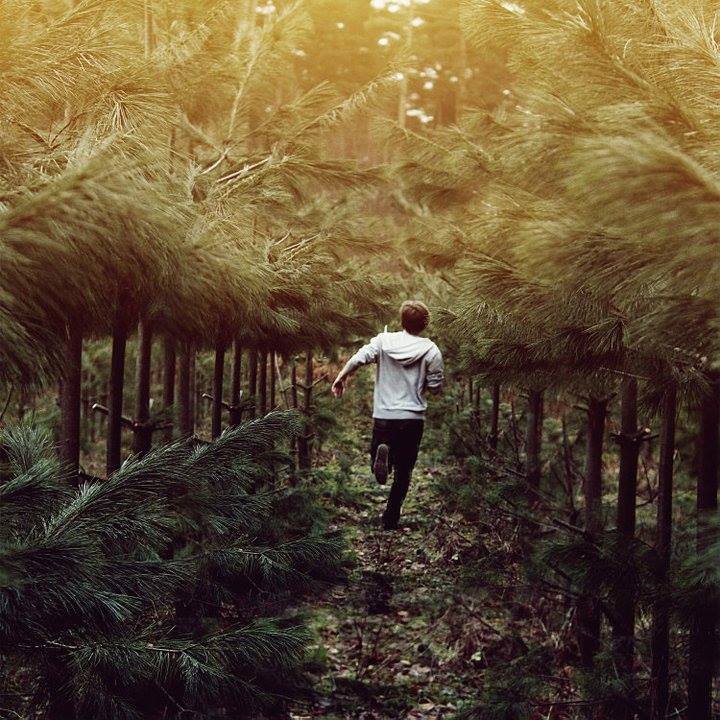Blocking or ignoring our sadness can mean that we never get to a place where we can move on and allow our rejuvenation. It means that we don’t make space for the new, or for healing and fresh possibilities. Sadness allows things to flow, it softens and moistens us. If we don’t get the chance to feel it we can become dry and brittle.  Things stop flowing, and we can become hard and inflexible. We may find that, if we are not prepared to feel our sadness we may feel threatened when someone suggests we might be sad. We may react in a judgemental way when someone else expresses sadness, and so try to crush their sadness as we have crushed and ignored our own. We are not able to be with any other sadness in case it touches our grief. We may be afraid that if we touch or express our sadness we will never be able to stop. We fear that our sadness is a bottomless pit, and that if we slip into it we will never get back out. Or we may fear that our sadness, if felt, would simply be too much to bear. We can’t take the risk of going near it. We may unconsciously decide to ‘stuff’ our sadness down; with food or with alcohol or any other drugs or addictions. Anything that can temporarily stop us feeling and help us avoid the real pain of our grief.
Things stop flowing, and we can become hard and inflexible. We may find that, if we are not prepared to feel our sadness we may feel threatened when someone suggests we might be sad. We may react in a judgemental way when someone else expresses sadness, and so try to crush their sadness as we have crushed and ignored our own. We are not able to be with any other sadness in case it touches our grief. We may be afraid that if we touch or express our sadness we will never be able to stop. We fear that our sadness is a bottomless pit, and that if we slip into it we will never get back out. Or we may fear that our sadness, if felt, would simply be too much to bear. We can’t take the risk of going near it. We may unconsciously decide to ‘stuff’ our sadness down; with food or with alcohol or any other drugs or addictions. Anything that can temporarily stop us feeling and help us avoid the real pain of our grief.
Ignoring our sadness we may put on a ‘happy face’ or a ‘brave face’. We smile to others, but there is no warmth emanating from us. Instead we seem empty in some way.  If we continue like this we may gradually loose touch not only with our sadness, but also with our ability to connect to others. If we cannot take the risk of feeling our sadness then we cannot take the risk of getting close to another person, or forming connections with a place or a group of people in case sadness gets stirred again.
If we continue like this we may gradually loose touch not only with our sadness, but also with our ability to connect to others. If we cannot take the risk of feeling our sadness then we cannot take the risk of getting close to another person, or forming connections with a place or a group of people in case sadness gets stirred again.
Along with this, we may also lose touch with our ability to express ourselves and our feelings, our wants and desires. We may not even be able to work out for ourself how we feel, we have become so out of touch with that part of us. It has become too dangerous, too potentially painful to reach inside and find out what’s going on, or to let another person know us.
We can lose our trust in the natural flow of life. We no longer trust that our needs will be taken care of, that something new will come along for us. We may become quite puritanical in an unconscious attempt to avoid the pain that love and connection can bring and to keep our life ‘clean’ so we don’t run the risk of ‘murky’ emotions like longing or grief. We feel lonely.
Our sadness may get stuck in our bodies where it can overwhelm us in the form of physical illness or some kind of breakdown.  Alternatively we may seek out all sorts of artificial feelings that are less painful than experiencing the sense of loss. We may feel intensely sad or angry about things that aren’t really to do with us. Or we may seek out a constant buzz of artificial high’s to distract us from our pain. We may move from one emotional crisis to another in our life, in a way where it looks like we’re feeling a lot, but actually we are distracting ourselves from the deep grief we hold, which remains unfelt. We may chose to punish ourselves for the loss we suffered, to dwell on possible mistakes we made and feel intense guilt, rather than to actually feel the real raw pain of our loss.
Alternatively we may seek out all sorts of artificial feelings that are less painful than experiencing the sense of loss. We may feel intensely sad or angry about things that aren’t really to do with us. Or we may seek out a constant buzz of artificial high’s to distract us from our pain. We may move from one emotional crisis to another in our life, in a way where it looks like we’re feeling a lot, but actually we are distracting ourselves from the deep grief we hold, which remains unfelt. We may chose to punish ourselves for the loss we suffered, to dwell on possible mistakes we made and feel intense guilt, rather than to actually feel the real raw pain of our loss.
 Malidoma Some comes from the Dagara tribe in West Africa. He writes ‘At Dagara funerals it’s always necessary that members of the immediate family be accompanied by a group of friends in order that they not injure themselves in the paroxysms of their grief. And it is these very paroxysms that are necessary if one’s grief is to be purged. Unlike people in the West, the Dagara believe it is terrible to suppress one’s grief. Only with passionate expression can loss be tamed and assimilated in to a form one can live with. The Dagara believe that an adult who cannot weep is a dangerous person who has forgotten the place emotion holds in a person’s life.’
Malidoma Some comes from the Dagara tribe in West Africa. He writes ‘At Dagara funerals it’s always necessary that members of the immediate family be accompanied by a group of friends in order that they not injure themselves in the paroxysms of their grief. And it is these very paroxysms that are necessary if one’s grief is to be purged. Unlike people in the West, the Dagara believe it is terrible to suppress one’s grief. Only with passionate expression can loss be tamed and assimilated in to a form one can live with. The Dagara believe that an adult who cannot weep is a dangerous person who has forgotten the place emotion holds in a person’s life.’
For further reading see our blog about accessing and expressing grief:
For further information about Healing The Shadow work, including details of group workshops, 1-2-1 sessions, couples work and the practitioner training please visit healingtheshadow.co.uk
Sign up here to receive a monthly newsletter with upcoming workshop information and other Healing The Shadow news.